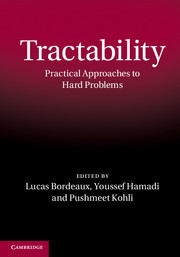Book contents
- Frontmatter
- Contents
- Contributors
- Introduction
- Part 1 Graphical Structure
- Part 2 Language Restrictions
- 3 Submodular Function Maximization
- 4 Tractable Valued Constraints
- 5 Tractable Knowledge Representation Formalisms
- Part 3 Algorithms and their Analysis
- Part 4 Tractability in Some Specific Areas
- Part 5 Heuristics
5 - Tractable Knowledge Representation Formalisms
from Part 2 - Language Restrictions
Published online by Cambridge University Press: 05 February 2014
- Frontmatter
- Contents
- Contributors
- Introduction
- Part 1 Graphical Structure
- Part 2 Language Restrictions
- 3 Submodular Function Maximization
- 4 Tractable Valued Constraints
- 5 Tractable Knowledge Representation Formalisms
- Part 3 Algorithms and their Analysis
- Part 4 Tractability in Some Specific Areas
- Part 5 Heuristics
Summary
One approach for dealing with intractability is to utilize representations that permit certain queries of interest to be computable in polytime. Such tractable representations will ultimately be exponential in size for certain problems and they may also not be suitable for direct specification by users. Hence, they are typically generated from other specifications through a process known as knowledge compilation. In this chapter, we review a subset of these tractable representations, known as decomposable negation normal forms (DNNFs), which have proved influential in a number of applications, including formal verification, model-based diagnosis and probabilistic reasoning.
Introduction
Many areas of computer science have shown a great interest in tractable and canonical representations of propositional knowledge bases (aka, Boolean functions). The ordered binary decision diagram (OBDD) is one such representation that received much attention and proved quite influential in a variety of areas [13]. Within AI, the study of tractable representations has also had a long tradition (e.g., [61, 30, 31, 49, 62, 14, 28, 19, 13, 52, 66, 50]). This area of research, which is also known as knowledge compilation, has become more systematic since [28], which showed that many known and useful representations are subsets of negation normal form (NNF) and correspond to imposing specific properties on NNF. The most fundamental of these properties turned out to be decomposability and determinism, giving rise to the corresponding language of DNNF and its subset, d-DNNF. This chapter is dedicated to DNNF and its subsets, which also include the influential language of OBDDs, and the more recently introduced sentential decision diagrams (SDDs).
- Type
- Chapter
- Information
- TractabilityPractical Approaches to Hard Problems, pp. 141 - 172Publisher: Cambridge University PressPrint publication year: 2014
- 1
- Cited by



